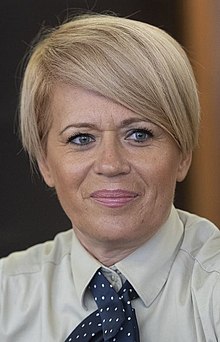The politics of Slovenia takes place in a framework of a parliamentary representative democratic republic, whereby the Prime Minister of Slovenia is the head of government, and of a multi-party system. Executive power is exercised by the Government of Slovenia. Legislative power is vested in the National Assembly and in minor part in the National Council. The judiciary of Slovenia is independent of the executive and the legislature. Slovenia is a Member State of the European Union and is represented in the Council of the EU and through elections to the European Parliament.

The Slovenian Democratic Party, formerly the Social Democratic Party of Slovenia, is a conservative parliamentary party; it is also one of the largest parties in Slovenia, with approximately 30,000 reported members in 2013.

The Social Democrats is a centre-left and pro-European social-democratic political party in Slovenia led by Matjaž Han. From 1993 until 2005, the party was known as the United List of Social Democrats. It is the successor of the League of Communists of Slovenia. As of 2022, the party is a member of a three-party coalition government with Robert Golob's Freedom Movement alongside The Left, as well as a full member of the Party of European Socialists and Progressive Alliance.

The Democratic Party of Pensioners of Slovenia is a political party in Slovenia led by Ljubo Jasnič. The party claims broadly liberal values with a strong focus on the interests of the retired and the elderly. Despite being part of virtually every governmental coalition of Slovenia since it started appearing on voting ballots, the party only secured 0.66% of all votes at the most recent Slovenian parliamentary election in 2022 and thus failed to secure any seats in the National Assembly.
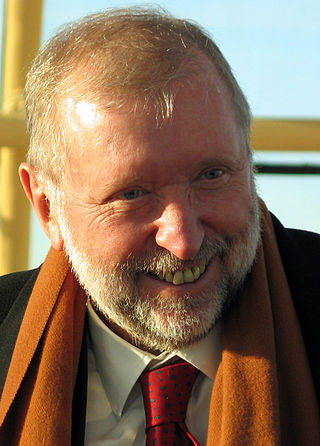
Dimitrij Rupel is a Slovenian politician.
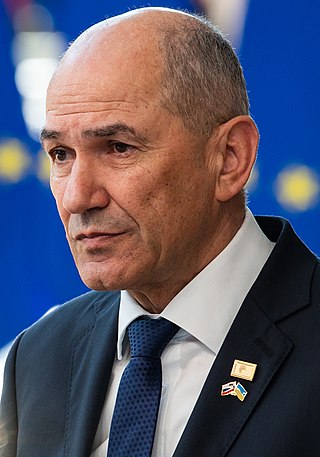
Ivan Janša, baptized and best known as Janez Janša, is a Slovenian politician who served three times as a prime minister of Slovenia, a position he had held from 2004 to 2008, from 2012 to 2013, and from 2020 to 2022. Since 1993, Janša has led the Slovenian Democratic Party, which has emerged as the pre-eminent Slovenian conservative party. Janša lost his fourth bid for prime minister in April 2022, his party defeated by the Freedom Movement party.
The JBTZ trial or the JBTZ affair, also known as the Ljubljana trial or the Trial against the Four was a political trial held in a military court in Slovenia, then part of Yugoslavia in 1988. The defendants, Janez Janša, Ivan Borštner, David Tasić and Franci Zavrl, were sentenced to between six months' and four years' imprisonment for "betraying military secrets", after being involved in writing and publishing articles critical of the Yugoslav People's Army. The trial sparked great uproar in Slovenia, and was an important event for the organization and development of the liberal democratic opposition in the republic. The Committee for the Defence of Human Rights was founded on the same day of the arrest, which is generally considered as the beginning of the so-called Slovenian Spring.
The Slovenian Intelligence and Security Agency is the main civilian intelligence service of Slovenia and as a government agency is subordinated directly to the Prime Minister of Slovenia. The mission of SOVA as the central intelligence and security service in the Republic of Slovenia is to provide national security. The agency's headquarters are located at Stegne Street in Dravlje, northwest of Ljubljana's centre.

Karl Viktor Erjavec is a Slovenian lawyer and politician who served in the government of Slovenia as Minister of Foreign Affairs from 2012 to 2018. He was the president of the Democratic Party of Pensioners of Slovenia, having held the position from 2005 to January 2020 and again from December 2020 until March 2021. He was Minister of Defense from 2004 to 2008 and 2018 to 2020 and Minister of Environment and Spatial Planning from 2008 to 2010.

Milan Zver is a Slovenian politician and Member of the European Parliament (MEP) from Slovenia. He is a member of the Slovenian Democratic Party, part of the European People's Party. He is the Vice-President of the Slovenian Democratic Party. He served as Minister of Education and Sports from 2004 to 2008.

Milan Pogačnik is a Slovenian politician. Between November 2008 and March 2010, he served as the Minister of Agriculture, Forestry and Nutrition of Slovenia.

2014 European Parliament elections were held in Slovenia on 25 May 2014. It was the first in the series of three elections held in the 2014, and the major test leading up to the parliamentary elections in July. The political atmosphere was in a crisis that started with the fall of Borut Pahor's government, then Janez Janša's government in 2013, the latter coming after Janša was accused of corruption. The cabinet of Alenka Bratušek was breaking up, as the former leader of the Positive Slovenia Zoran Janković, who was under the suspicion of corruption, announced his candidature for party president, even though the coalition parties threatened to leave the government if he was to be elected, which later he was.

The 8th Government of Slovenia led by Prime Minister Janez Janša was announced on 3 December 2004. The government was formed after the 2004 Slovenian parliamentary election. It was the first government of Janez Janša, and third centre-right government in the history of the Republic of Slovenia. Slovenian Democratic Party won on the elections 29% of the votes and so became the strongest parliamentary party in the National Assembly. The party nominated Janez Janša as the candidate for the mandatary, who was confirmed by the president Janez Drnovšek. It was one of the most stable governments of Slovenia, which ruled in the times of the greatest economical boom. In 2004–2006, the economy grew on average by nearly 5% a year in Slovenia; in 2007, it expanded by almost 7%. The growth surge was fuelled by debt, particularly among firms, and especially in construction. The price for a boom that veered out of control has been paid in years from 2009 onwards.
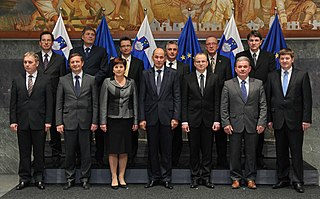
The 10th Government of Slovenia and the second one of Janez Janša was announced on 10 February 2012. It was formed after the 2011 Slovenian parliamentary election. It was the second government of Janez Janša, and so he became the second premier to return to the position, after Janez Drnovšek, who was prime minister four times.
Events in the year 2018 in Slovenia.
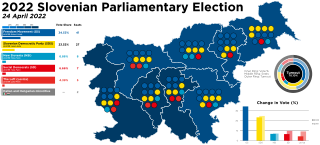
Parliamentary elections were held in Slovenia on 24 April 2022 to elect all 90 members of the National Assembly.
The 14th Government of Slovenia was formed following the resignation of Prime Minister of the 13th Government Marjan Šarec in January 2020. Janez Janša of Slovenian Democratic Party formed a coalition with Modern Centre Party, New Slovenia, and Democratic Party of Pensioners of Slovenia. The government was confirmed on 13 March 2020, amidst the COVID-19 pandemic.
Events in the year 2020 in Slovenia.
Events in the year 2022 in Slovenia.
Slovenia has been a member of the European Union since 2004.
